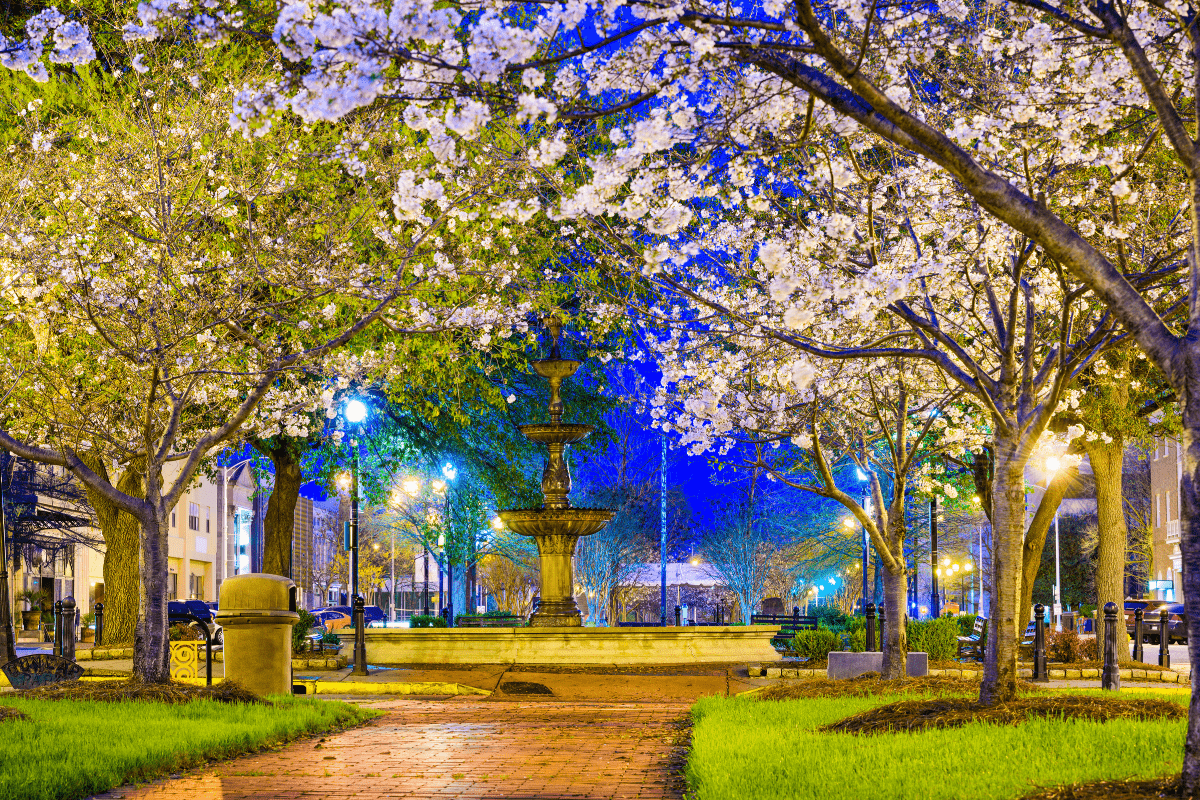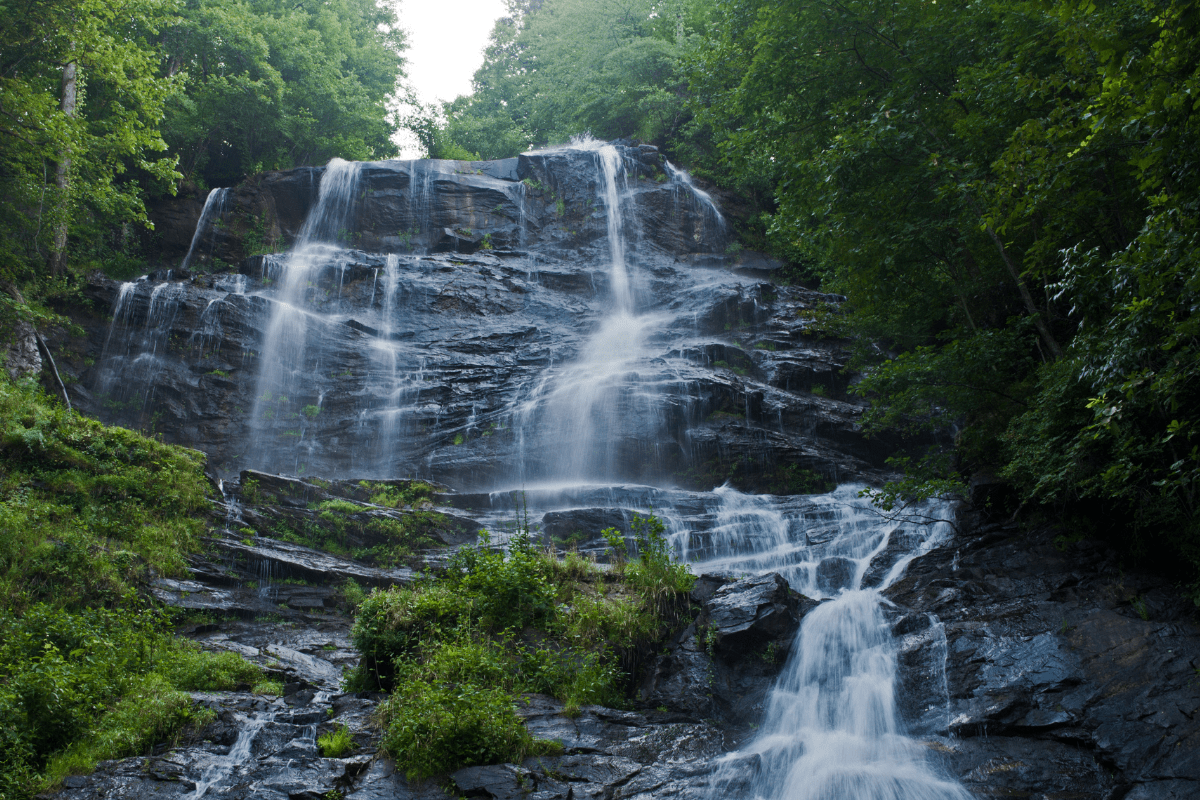Planning a Georgia getaway shouldn't feel like solving a weather puzzle, but let's be honest—showing up in Savannah during August is like voluntarily signing up for a sauna membership you never wanted. After watching countless tourists melt on Atlanta sidewalks and freeze at unexpected mountain elevations, I've compiled this seasonal guide to help you actually enjoy your Georgia adventure.
Why timing matters more in Georgia than you'd think
Georgia's weather has more personalities than a reality TV cast. The state stretches from the Appalachian foothills to the Atlantic Ocean, creating wildly different experiences depending on when and where you visit. Those 171 million annual visitors aren't randomly distributed throughout the year—they've figured out the secret sauce of Georgia travel timing.
Spring and fall emerge as the undisputed champions, delivering those magical 65-80°F days when you can actually walk more than a block without questioning your life choices. Hotel occupancy data backs this up, with spring festivals and fall foliage season creating booking frenzies that would make Black Friday shoppers jealous. Meanwhile, summer sends everyone fleeing to the coast or mountains, and winter quietly becomes the budget traveler's best-kept secret with accommodation rates dropping faster than autumn leaves.
The humid subtropical climate means you're essentially choosing between sweating through your shirt in summer or scoring amazing deals in winter. But here's the thing—each season unlocks different cities and experiences across Georgia, turning potential weather woes into strategic advantages.
Spring in Georgia: When everything blooms and nothing hurts
March through May delivers peak Georgia magic
Spring in Georgia feels like nature's apology for those few weeks of winter we pretend were harsh. Temperatures climb from a pleasant 70°F in March to a still-manageable 85°F by May, creating what I call the "Goldilocks zone" of Georgia weather—not too hot, not too cold, just right for exploring everything from mountain trails to city streets.
Macon becomes cherry blossom central
Forget flying to Japan—Macon's International Cherry Blossom Festival transforms this central Georgia city into a pink paradise every March. We're talking 350,000 Yoshino cherry trees painting the town in Instagram-worthy hues. The 10-day celebration pulls in over 100,000 visitors and generates $10-12 million in economic impact, with nearly a third of attendees traveling from outside Georgia just to witness this blooming spectacle.
The festival includes everything from concerts to a parade that makes you wonder if someone accidentally ordered too much pink fabric and just went with it. Pro tip: Book your Macon accommodations by January because hotels fill up faster than you can say "cherry blossom."
Savannah springs to life (literally)
If Savannah were a person, early May would be when it puts on its best outfit and actually tries. Tourism hits its peak as azaleas explode across the historic squares, creating a floral backdrop that makes every photo look professionally staged. The city's legendary St. Patrick's Day celebration—heading into its 200th anniversary—transforms the riverfront into one of America's largest Irish festivals. Yes, everyone suddenly becomes Irish for a day, and yes, the river really does turn green.
The Savannah Music Festival spans March and April, turning the city into a living jukebox. With temperatures hovering around 75-80°F, you can actually enjoy walking between venues without feeling like you're training for a marathon in a steam room.
Atlanta embraces its festival personality
Spring Atlanta is like that friend who suddenly discovers they're good at hosting parties. The Atlanta Dogwood Festival takes over Piedmont Park in April, celebrating those delicate white and pink blooms that make the city temporarily forget about traffic. Add in the Atlanta Film Festival and Shaky Knees Music Festival, and you've got a cultural smorgasbord that pushes hotel occupancy to 74%.
The weather cooperates beautifully, making outdoor events actually enjoyable rather than endurance tests. Even better, spring comes before the summer tourist tsunami, meaning you can visit the Georgia Aquarium without feeling like a sardine yourself.
Mountain towns wake from winter hibernation
Helen's Mount Yonah Trail becomes nature's carpet store, displaying wildflowers in patterns that would make Persian rug makers jealous. Dahlonega offers perfect vineyard-hopping weather before the summer crowds discover wine tasting is more fun when you're not sweating into your Chardonnay.
The Blue Ridge Scenic Railway starts chugging in mid-March, offering mountain views before summer foliage plays hide-and-seek with the vistas. It's like getting front-row seats before the theater fills up.
Columbus rides the river wave
Columbus capitalizes on spring river conditions, with whitewater rafting hitting its sweet spot thanks to winter rainfall creating just enough excitement without requiring a death wish. The city's RiverFest celebrates this aquatic advantage, while the 22-mile RiverWalk becomes actually walkable in spring temperatures.
Summer in Georgia: Strategic retreats and water worship
June through August tests your heat tolerance
Let me be clear: Georgia summer is not for the weak. When Southern Living magazine describes the humidity as "oppressive," they're being polite. Temperatures regularly exceed 90°F, creating a special kind of heat that makes you understand why mint juleps were invented. But don't write off summer entirely—it's all about knowing where to go.
Coastal areas become summer salvation
When the rest of Georgia transforms into nature's convection oven, the coast offers sweet relief. Water temperatures reach a balmy 80-90°F, perfect for swimming if you can dodge the afternoon thunderstorms that arrive with the reliability of a German train schedule.
Top coastal summer escapes include:
- Tybee Island (20 minutes from Savannah)
- Jekyll Island's Summer Waves Water Park
- St. Simons Island for early morning golf
- Cumberland Island (book ferry weeks ahead)
One small caveat: hurricane season runs June through November, with September historically being the drama queen of storm months. But hey, that's what travel insurance is for.
Mountain towns: Nature's air conditioning
Helen and Blue Ridge become Georgia's emergency cooling centers, maintaining temperatures roughly 10 degrees cooler than Atlanta. When valley temperatures hit 95°F+, that "Cool Blue Ridge breeze" feels like a gift from the weather gods.
Helen's tubing season on the Chattahoochee River runs May through September, offering the kind of lazy river experience that makes you forget your email password—in the best way. Book mountain cabins early because everyone else has the same "escape the heat" idea.
Atlanta adapts with indoor intelligence
Summer Atlanta smartly shifts focus to indoor attractions. The Georgia Aquarium and World of Coca-Cola suddenly make perfect sense when stepping outside feels like walking into a hair dryer. Outdoor events migrate to evening hours, including the Atlanta Ice Cream Festival in July—because if you're going to melt anyway, might as well be eating ice cream.
The silver lining? Fewer summer visitors mean shorter attraction lines. You can actually see the pandas at Zoo Atlanta without playing human Tetris.
Athens becomes a different city
When UGA students flee for summer break, Athens transforms from bustling college town to relaxed cultural destination. AthFest in June draws 45,000 music lovers for three days of free performances, proving that Athens has an identity beyond football.
Local breweries like Terrapin Beer Co. and Creature Comforts become refuges of air-conditioned bliss. Nothing says "beating the Georgia heat" quite like a cold craft beer in a brewery that understands the assignment.
Fall in Georgia: Peak everything
September through November wins the popularity contest
If Georgia seasons were competing in a talent show, fall would walk away with all the trophies. This is when the state fires on all cylinders—comfortable temperatures, stunning foliage, and festivals that make you wonder if anyone actually works during October.
Tourist data confirms what locals know: this is peak season. Mountain accommodation prices jump 30-50% during October weekends, and for good reason. The weather delivers consistent 70s-80s perfection, fall colors paint the landscape in Instagram gold, and festivals multiply like rabbits.
Helen's Oktoberfest: Bavaria meets Blue Ridge
Helen leans hard into its Bavarian theme during Oktoberfest, running from September 4 through November 2. As America's longest-running Oktoberfest hits its 55th anniversary in 2025, hundreds of thousands of visitors descend upon this alpine-inspired town. Weekend admission runs $15, and the crowds can literally triple the town's population.
Fall foliage typically peaks during the third week of October at higher elevations, creating a perfect storm of lederhosen and leaf-peepers. Book Oktoberfest accommodations 6-13 months in advance, or prepare to sleep in your car.
Dahlonega strikes gold (again)
Gold Rush Days Festival during the third weekend of October attracts over 200,000 visitors to celebrate America's first gold rush. With 300+ craft vendors and recognition as a Top 20 Event by the Southeast Tourism Society, it's basically Black Friday for people who prefer handmade pottery to electronics.
The surrounding vineyards hit their stride during harvest season (late September through early November), with 12 tasting rooms offering the perfect excuse to day drink in the name of agriculture.
Athens reaches peak insanity (in a good way)
Football season transforms Athens into a completely different beast. The city's population "more than doubles on home football weekends," creating an atmosphere that makes Times Square on New Year's Eve look calm. Hotel rates skyrocket, restaurant wait times stretch into next week, and everyone suddenly becomes a Georgia Bulldogs expert.
But here's the thing—the combination of SEC football and perfect fall weather (highs in the 70s-80s) creates an electric atmosphere you won't find anywhere else. The third week of September consistently scores as Athens' best weather for tourism, if you can handle the crowds.
Atlanta's outdoor festival explosion
Fall Atlanta is like spring Atlanta's more experienced older sibling. Temperatures between 75-87°F enable an outdoor festival bonanza. Music Midtown in September takes over Piedmont Park, while the Little Five Points Halloween Parade showcases Atlanta's weird side (and Atlanta has a wonderfully weird side).
Hotel occupancy peaks during fall months, so booking early isn't just recommended—it's survival.
Savannah embraces its spooky side
October Savannah leans into its "most haunted city" reputation harder than a method actor preparing for a role. Ghost tour bookings reach annual highs as visitors seek supernatural thrills in the atmospheric squares. The Savannah Film Festival adds Hollywood glamour to the historic district, while evening temperatures in the 60s-70s create perfect conditions for post-dinner haunted strolls.
Winter in Georgia: The budget traveler's secret season
December through February offers surprising perks
Winter Georgia is like finding a designer dress at a thrift store—unexpected value hiding in plain sight. Temperatures rarely drop below 50°F in most cities, and accommodation prices fall 20-40%, making this the smartest season for budget-conscious travelers who don't mind wearing a light jacket.
Helen transforms into Christmas magic
Helen earns recognition as one of America's top Christmas towns, and they commit to the bit harder than a method actor. The Bavarian architecture provides an authentic backdrop for holiday markets and the annual Christkindlmarkt. Walking through Helen in December feels like stepping into a snow globe—minus the actual snow, because this is still Georgia.
Holiday lights done right
Some destinations mail it in for holiday lights. Georgia does not. Callaway Gardens' Fantasy in Lights illuminates 7 miles with over 10 million lights from November through early January. Forbes ranked it third nationally, which is like getting a Michelin star for Christmas decorations.
The Atlanta Botanical Garden creates its own light magic, proving that gardens can be just as stunning when the plants are sleeping.
Cultural attractions without crowds
Winter is when Georgia's indoor attractions shine brightest:
- Augusta's Morris Museum of Art
- Macon's Ocmulgee Mounds National Historical Park
- Columbus military heritage sites
- Thomasville's Victorian Christmas Festival
You can actually contemplate art without someone's selfie stick in your peripheral vision.
Coastal winter: Surprisingly appealing
Savannah maintains 60-degree temperatures that make exploring comfortable without the summer sweat factor. Yes, water temperatures of 50-67°F will discourage swimming unless you're training for an Arctic expedition, but that's what heated hotel pools are for.
The lack of crowds at places like Wormsloe Historic Site means you can actually hear the Spanish moss rustling instead of tour groups chattering. As Supriya Christopher from Visit Savannah notes, the city offers "gorgeous weather throughout the year"—translation: winter doesn't suck here.
Atlanta's winter advantages
Atlanta winters hit that sweet spot of 55-65°F, enabling year-round outdoor activities without weather-related suffering. Martin Luther King Jr. Day celebrations in January add cultural significance to your visit. Plus, winter hotel rates drop so dramatically that you can finally afford that fancy downtown hotel you've been eyeballing.
Pro tips for mastering Georgia's seasons
After years of watching tourists show up at the wrong time in the wrong place, here's what actually works:
Optimal travel windows: Late April through May and late September through October consistently deliver the best experiences. Emily from travel blog Wander-Lush specifically warns against July and August visits, and she's not wrong. Lonely Planet puts it perfectly: "Shoulder seasons are my favorite time to experience the gifts of Georgia's outdoors."
Hurricane season reality check: If you're heading to the coast June through November, understand that hurricane season peaks in September. Travel insurance must be purchased at least 24 hours before any storm is named—after that, you're on your own.
Regional temperature hacks: Blue Ridge stays 10 degrees cooler than surrounding areas during summer. Coastal breezes moderate Savannah's heat by 5-10 degrees compared to inland spots. Winter mountain roads can become impassable, making coastal destinations more reliable during cold snaps.
Booking strategies that actually work: Masters Tournament week in Augusta requires booking a year in advance, with rates hitting 300-400% of normal. Athens becomes affordable when you avoid football weekends or visit during summer break—we're talking 50% savings. Helen's Oktoberfest weekends need 6-13 months advance planning, but weekday visits offer much better availability.
The bottom line on Georgia seasons
Georgia isn't a one-season destination—it's a choose-your-own-adventure state where timing determines everything. Spring and fall deliver those magazine-worthy experiences that make your friends jealous. Summer requires strategic thinking and a high heat tolerance. Winter rewards flexible travelers with deals and smaller crowds.
Those 171 million annual visitors have figured out what works for them. Whether you're chasing cherry blossoms in Macon, escaping to Blue Ridge's mountain breezes, or scoring winter deals in Atlanta, Georgia offers year-round appeal—you just need to know when to show up where.





